Metathe parent company of the Facebook App, said it had locked well 1600 fake account related to Russian propaganda. These, in fact, pretended to belong to European newspapers to promote one pro-Kremlin vision of the war in Ukraine. Similarly, the social media giant claims to have eliminated a network originating in China that targeted US mid-term elections and criticized the Czech government. And while the two removals are unrelated to each other, this shows how social media has become a tool capable of shaping the narrative of high-profile events.
Facebook: App blocks over 1000 accounts related to Russian propaganda
In these hours Meta said that the Russian propaganda operation was the largest and most complex he has interrupted since Putin invaded Ukraine. 1600 blocked accounts, on the other hand, are not at all few. But what was the controversial information provided by the accounts? “You can actually sum up everything they were saying in ten words: ‘Ukraine is bad. Russia is good. Stop the sanctions. Stop supplying weapons, ‘”she said Ben Nimmo, Meta’s chief of global threat intelligence. The campaign involved more than 60 websites who passed off as European and high-profile newspapers, including The Guardian, Daily Mail, Der Spiegel and even the Italian news agency ANSA.
As reported by Nimmo, the websites were built with extreme care, copying the original layouts, mimicking web addresses, and even including working links to other articles. And it would have been this attention to detail that would have blown the whole operation. “They outdid themselves,” Nimmo said. “If you pretend to be Spiegel in Germany in front of an audience where Spiegel is one of the most famous brands in the country, then what you are doing is increasing the risk of someone looking at you and saying, ‘Wait a minute, this isn’t the real thing ‘”. Add to this that the “fake” sites published articles in multiple languages with pro-Kremlin narratives. The news included the accusation of corruption to the Ukrainian government and army, and the warning of the terrible consequences of the European sanctions on Russia.
“They were trying to do some sort of smash-and-grab raid on the computing environment. They tried to create these fakes and push them out so fast and so hard that they reached real people before they got caught, ”Nimmo reported. The use of fake accounts, therefore, served to push news from fake sites. In response, Meta has removed accounts, pages and groups on Facebook and Instagram related to Russian propaganda, which they have accumulated overall circa 5500 follower. An optimal solution, even if the question may not necessarily be eliminated completely.















Leave a Reply
View Comments